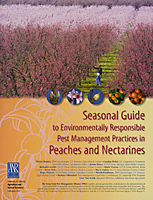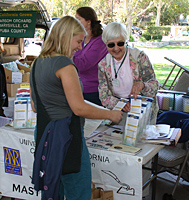
| | Next article | 2006 index | More reports | Previous article | |
2006 Annual Report UC Statewide IPM Program |
 UC IPM—responsive, innovative,
adaptable
UC IPM—responsive, innovative,
adaptable
For the newest advances in pest management, visit the UC IPM Web site for information on how to manage pests in your home and garden, or on the farm.
New for this year are five valuable publications:
- Seasonal Guide to Environmentally Responsible Pest Management Practices in Peaches and Nectarines
- Landscape Maintenance Pest Control
- Pesticide Safety: A Reference Manual for Private Applicators and the Spanish translation Seguridad en el manejo de pesticidas Manual de referencia para aplicadores privados
- Integrated Pest Management for Potatoes in the Western United State, second edition
- Residential, Industrial, and Institutional Pest Control, second edition
To order UC IPM manuals and the pesticide compendium series, visit anrcatalog.ucdavis.edu, or call 1-800-994-8849.
 Else-Marie Augusti asks Mary Strohl, a master gardener for Yolo County, a gardening question at the Davis Farmer’s Market. Photo by Karey Windbiel-Rojas. |
Survey says UC IPM resources are widely used by master gardeners
Results just in from a survey of UC master gardeners indicate that UC IPM tools are widely used throughout California in programs that extend pest management information to the public. The survey queried master gardener coordinators and others who attended UC IPM-sponsored statewide training in June 2005. About 90 percent of California’s master gardener programs were represented.
More than 95 percent log on to the UC IPM Web site to answer the public’s questions. Most use the UC IPM pest notes on a regular basis and hand out the UC IPM Quick Tips at garden shows, county fairs, plant clinics, and other community programs.
About the UC IPM ProgramThe University of California Statewide IPM Program was established in 1979 to develop and promote the use of integrated, ecologically sound pest management programs in California. It sponsors activities throughout California. UC IPM Highlights is an annual publication of the University of California Statewide IPM Program. Edited by Stephanie Klunk; design and production by Marianne Post, Repro Graphics. Web production by Adam Shiffman. For more copies, contact webmaster.
|
Residential use of pesticides, especially insecticides applied for ant control, has been identified as a major contributor to pollution of California’s urban creeks and waterways. Master gardeners’ efforts to educate Californians about how they can manage ants and other pests without using pesticide sprays greatly enhances UC IPM’s ability to deliver least-toxic solutions and will likely contribute substantially to improving water quality.
New interactive training modules on integrated pest management and managing honeydew producing insects were finalized in late 2006. Master gardeners will be trained in the use of these products in 2007. USDA and the UC Slosson Endowment funded these training materials.
UC IPM revamps home and garden Web page
Hundreds of new pests have been added to the Pests in Homes, Gardens, Landscapes, and Turf section of the UC IPM Program Web site at ipm.ucanr.edu. For the first time, users can find pest management information specific to a host plant.
Next article >> Web only: Pests in dried plums
